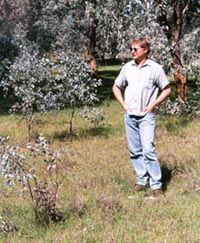 A Charles Sturt University (CSU) expert has hailed the recent announcement of federal government funding that supports the future management of Travelling Stock Routes (TSRs) in the Riverina.
A Charles Sturt University (CSU) expert has hailed the recent announcement of federal government funding that supports the future management of Travelling Stock Routes (TSRs) in the Riverina.Dr Peter Spooner, an expert in biodiversity conservation and the environmental history of TSRs, sees the announcement as further recognition of the biodiversity values of these important corridors of remnant vegetation found throughout many agricultural areas of NSW.
The NSW Livestock Health and Pest Authority (LHPA) currently receives no funding for maintaining the environmental values of TSRs, which are important to the whole community for:
- protecting endangered species and ecosystems;
- providing a connected network of habitat corridors; and,
- storing carbon, via regeneration and planting of new trees in rural landscapes.
“Unfortunately, the role of the LHPA is presently under review by the NSW government, which is also considering the sale of ‘non-profitable’ stock routes,” Dr Spooner said.
“The simple economic assessment used to appraise the cost of managing TSRs - in terms of grazing and weed control – has failed to include non-use benefits such as their biodiversity and cultural heritage values.”
Travelling Stock Routes are a multi-use reserve system that follows historic roads and tracks used to walk stock between grazing lands and markets during the 19th century.
“LHPA rangers are highly trained personnel who conduct grazing, fire, and weed management in TSRs, while maintaining and enhancing the environmental values of TSR for future generations,” Dr Spooner said.





Social
Explore the world of social